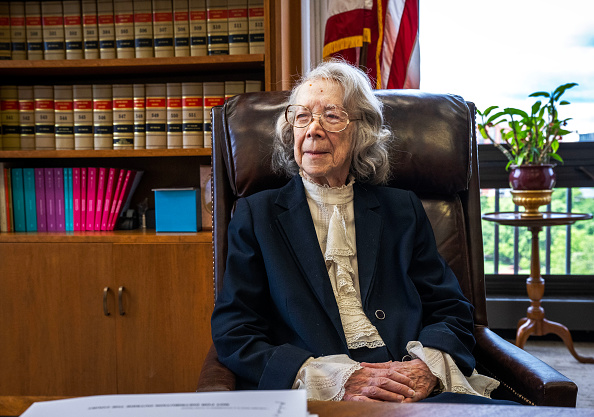Federal judge refuses to order reinstatement of 96-year-old federal appeals judge, her second loss in a week

Judge Pauline Newman of the U.S. Court of Appeals for the Federal Circuit in May 2023. A federal judge in Washington, D.C., has refused to order reinstatement to new case assignments for Newman, now 96, who claims that the laws governing judicial disability are unconstitutional. (Photo by Bill O’Leary/The Washington Post via Getty Images)
A federal judge in Washington, D.C., has refused to order reinstatement to new case assignments for a 96-year-old federal appeals judge who claims that the laws governing judicial disability are unconstitutional.
In a Feb. 12 decision, U.S. District Judge Christopher R. Cooper of the District of Columbia tossed six counts of the 11-count lawsuit by Judge Pauline Newman of the U.S. Court of Appeals for the Federal Circuit for lack of jurisdiction, one count for failure to state a claim on which relief can be granted, and part of a second count for failure to state a claim.
Newman is unlikely to prevail on the remaining claims, Cooper said. The defendants had not sought dismissal of those claims, but they can do so in the future, Cooper said.
Law360, Bloomberg Law and Reuters have coverage.
The Federal Circuit’s judicial council, which comprises all active judges on the circuit, had suspended Newman from hearing new cases for a year in September 2023. The council based the suspension on Newman’s refusal to submit to medical evaluations, to provide medical records or to sit for an interview. The council cited evidence suggesting memory loss, confusion, paranoia and an inability to perform some tasks.
Newman’s federal suit challenged the law that created circuit judicial councils, which can take action on complaints regarding judges’ physical and mental disabilities, and the Judicial Conduct and Disability Act, which governs the procedure in such cases.
Cooper said he has no jurisdiction to hear claims that the judicial disability laws are unconstitutional as applied to Newman and said allegations related to a since-lifted suspension related to a prior case backlog are moot.
The remaining counts in the federal suit allege that disability provisions of the law are unconstitutionally vague, and that a compelled medical exam and required disclosure of medical records are unconstitutional searches.
Cooper’s decision is the second loss for Newman in less than a week. The U.S. Judicial Conference’s Committee on Judicial Conduct and Disability ruled against Newman Feb. 7, rejecting her arguments that the case should have been moved to another circuit, that she was denied due process, and that her refusal to cooperate was justified.
Newman is represented by Gregory Dolin of the New Civil Liberties Alliance, a nonprofit civil rights organization. He told Law360 that he will proceed with the claims that remain live.
As for the dismissed claims, “we are evaluating our options and will seek review in the D.C. Circuit in due course and as necessary,” Dolin said.
See also:
“Investigations of federal judges are rare and should happen more, former clerk says”
“Lawyer for federal appeals judge barred from new cases finds orders ‘incredible’ and ‘stunning’”
“How can aging judges know when it’s time to hang up the robe?”



